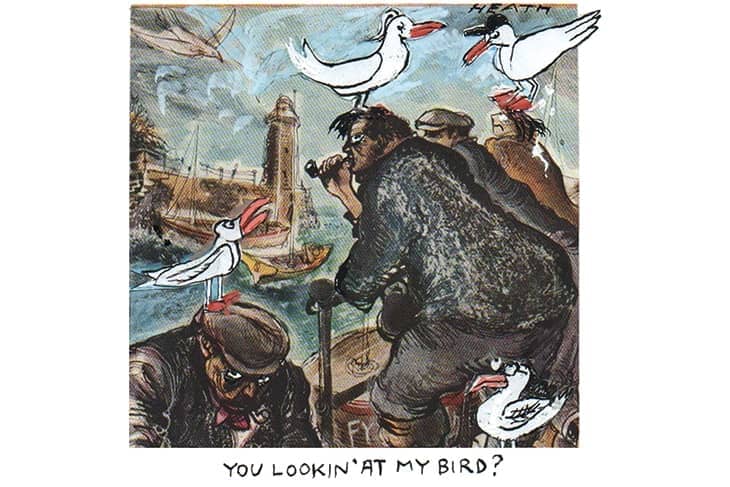Early this year, five dead herring gulls were discovered on a Cornish beach, and when tested it was found they had bird flu. This should have provoked serious concern: these were the first gulls to be found carrying bird flu in Britain. But because of the war and because we’re sick of epidemics, it was largely ignored.
The dead gulls matter because gulls live among us. Some 75 per cent of our herring gulls are now urban. There are 100,000 to 180,000 breeding on rooftops in England, according to the 2020 national census. Tim Newark sounded the alarm in these pages that year, but since then the problem has grown and now there may be bird flu to contend with.
Along with lesser black-backed gulls, herring gulls breed prolifically on rooftops, where their chicks are safe from foxes and badgers. Roofs provide unlimited space, so overcrowding is avoided, and without predators gulls prosper. They are spreading ever further inland and have reached the heart of the country. There are colonies – small as yet – in Oxford and Cambridge, and in some London suburbs. More towns and cities can expect to acquire nesting gulls this year.
Small urban colonies inevitably grow. The drift to the towns, which began with seaside buildings in the 1960s, continues. There is no drift back to the wild. And when colonies expand – as in Gloucester, Bath, York, Barrow-in-Furness and South Shields – the gulls become an extraordinary problem. There’s raucous bickering from 4 a.m., guano everywhere, and urban gulls have become airborne muggers. Their fear of humans has vanished. Snatching food is routine in some towns. Dive-bombing gulls may inflict bleeding scalp wounds. And then there’s the risk of disease. As we know from Covid, the infectious patterns of a virus can change. There is nothing to rule out a bird flu variant that hops from gulls to humans with brief contact.
Surprisingly, poultry have far more official protection than humans from the gull menace. Defra urges farmers to prevent their flocks catching diseases from wild birds. Allowing gulls into chicken sheds, letting them feast at the food-hoppers and leave droppings everywhere, would constitute a shocking lack of care in Defra’s view. Whereas Natural England (which regulates councils via a licensing system) is emphatic that having gulls feed on café tables, rip food from human hands or mouths and spread guano liberally in towns is merely a nuisance and not a threat to health.
This peculiar stance by Natural England is dictated by the fact that, under the Wildlife and Countryside Act 1981, wild birds can be ‘controlled’ only if they damage farmers’ livelihoods, harm endangered species or threaten public health and safety. In the case of urban gulls, this means removing eggs or treating them to stop hatching: things that councils could do freely until 2019, when the licensing regime changed.
With urban gulls, only health and safety risks are relevant. Determined to stop councils from curbing the rise in gull numbers, Natural England has adopted an idiosyncratic view of risks, apparently regarding neither guano nor sleep deprivation (as a result of their noise) as constituting risk, despite many scientific studies showing the opposite. Last year, the organisation’s licensing department required evidence of a severe health impact on an individual to allow a single nest to be removed. It refused all licence applications from Devizes council in 2020 and 2021. Worcester had to spend £300 on a psychologist’s report on a resident in order to be allowed to remove one nest. Gloucester, which used to remove 3,000 eggs a year before 2019, has given up trying to get licences. There is little hope that the scheme proposed by Natural England this year will be any more help to councils. It is being vaunted as a step forward, but examining the details suggests it will be just as restrictive.
What has led to this draconian regime? The Natural England licensing team insist that the herring gull is endangered, since it was placed on the UK’s ‘red list’ by a group of British ornithologists in 2015. Much was questionable about that decision, which was never peer-reviewed. It was based on declining numbers from 1970 to 2000. The International Union for the Conservation of Nature notes that this fall came after a huge rise all across northern Europe in the 1960s, caused by freely available domestic waste, plus fishery discards. The union sees the subsequent inter-national decline as a return to sustainable numbers.
The downward trend of gull numbers in the wild continues, though more slowly. At the same time, rising numbers in towns have cancelled out that decline. The most recent census shows that in England there are more herring gulls than there were in 1970 – and twice as many lesser black-backed gulls. But Natural England will not admit this recovery, preferring to quote obsolete figures, or only figures for natural (not urban) breeding sites in order to show a relentless decline. Its insistence that the gull population is imperilled has a quasi-religious quality to it. Yet Defra firmly believes in Natural England’s scientific competence and integrity and is happy to see our rooftops as a gigantic nature reserve.
This year and next will expose this attitude for the lunacy it is. The thousands of additional eggs that have hatched on rooftops since the licensing clampdown will cause a massive upsurge in numbers as the gulls begin to breed. Unless Defra wakes up, we could have an uncontrollable problem.
Got something to add? Join the discussion and comment below.
Get 10 issues for just $10
Subscribe to The Spectator Australia today for the next 10 magazine issues, plus full online access, for just $10.
You might disagree with half of it, but you’ll enjoy reading all of it. Try your first month for free, then just $2 a week for the remainder of your first year.














Comments
Don't miss out
Join the conversation with other Spectator Australia readers. Subscribe to leave a comment.
SUBSCRIBEAlready a subscriber? Log in